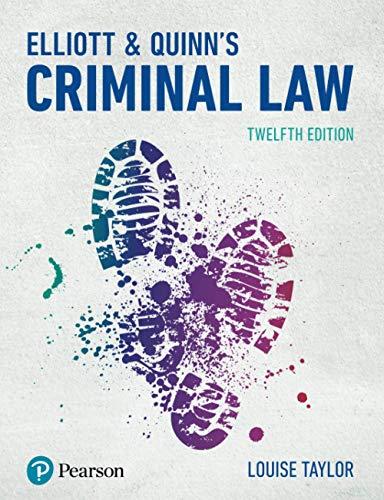Question
THE PEOPLE, Plaintiff and Respondent, v. JOSEPH KENNETH SORDEN, Defendant and Appellant. SUPREME COURT OF CALIFORNIA 36 Cal. 4th 65; 113 P.3d 565; 29 Cal.
THE PEOPLE, Plaintiff and Respondent, v. JOSEPH KENNETH SORDEN, Defendant and Appellant.
SUPREME COURT OF CALIFORNIA
36 Cal. 4th 65; 113 P.3d 565; 29 Cal. Rptr. 3d 777; 2005 Cal. LEXIS 6847 June 23, 2005, Filed
OPINION BY: BROWN
A registered sex offender must, within five working days of the offender's birthday, update his or her registration. (Pen. Code 290, subd. (a)(1)(D).) Willful failure to update one's registration is a felony. ( 290, subd. (g)(2).) In People v. Barker (2004) 34 Cal.4th 345, we held the willfulness element of the offense may not be negated by evidence the defendant "just forgot" to register. We reserved judgment "as to whether forgetfulness resulting from, for example, an acute psychological condition, or a chronic deficit of memory or intelligence might negate the willfulness required for a section 290 violation." This case presents the question whether forgetting to update one's registration because of severe depression may negate the section 290 willfulness requirement.
I.
Defendant is a registered sex offender, and so must update his registration within five working days of his birthday. ( 290, subd. (a)(1)(D).) Defendant's birthday is December 6; in 2001, he did not update his registration until December 22. He voluntarily came to the Pacifica police station to do so. According to the officer who interviewed him, defendant said "he had simply forgotten to." Defendant added he had "gotten up that morning, realized he hadn't registered and that he needed to do so." While defendant claims to have forgotten to register on this occasion, there is no question but that he was ordinarily well aware of his obligation. He had complied with it on numerous occasions in the past. He was, he testified, "stunned" he had forgotten to update his registration this time. "It was something I don't usually forget at all. I'm constantly reminded of it every day." Indeed, defendant asserted he would "never forget" the day he was first required to register as a sex offender.
At trial, defendant testified he forgot to update his registration because he was "in a pretty depressed state due to many issues."
Finding defendant guilty of willfully failing to update his registration ( 290, subd. (g)(2), the court suspended imposition of sentence and granted defendant probation for three years, subject to, among others, the condition that he pay a restitution fine of $ 200, and that he serve 90 days in the county jail with credit for time served. The Court of Appeal reversed. "We agree with [defendant] that genuinely forgetting to register negates the element of willfulness required in section 290, and therefore, the trial court erred in refusing to admit testimony that [defendant] failed to remember to register." We reverse the judgment of the Court of Appeal, and we remand the cause for further proceedings consistent with the views expressed herein.
II.
In Garcia, we held that a violation of section 290 requires actual knowledge of the duty to register. "In a case like this, involving a failure to act, we believe section 290 requires the defendant to actually know of the duty to act.
And we realize a person may suffer from an involuntary condition so disabling as to rob him of knowledge of his registration obligations under section 290. Therefore, in order to avoid any due process problems, we hold that a defendant charged with violation of section 290 may present substantial evidence that, because of an involuntary condition, temporary or permanent, physical or mentalhe lacked actual knowledge of his duty to register.
Only the most disabling of conditions, we emphasize, would qualify under the standard we announce today. Severe Alzheimer's disease is one example that comes to mind; general amnesia induced by severe trauma is another. Defendant's claimed depression clearly did not satisfy this standard.
There is no question but that he knew of his duty to register. He simply claimed his depression made it more difficult for him to remember to register. However, life is difficult for everyone. As a society, we have become increasingly aware of how many of our fellow citizens must cope with significant physical and mental disabilities. But cope they do, as best they can, for cope they must. So, too, must defendant and other sex offenders learn to cope by taking the necessary measures to remind themselves to discharge their legally mandated registration requirements. It is simply not enough for a defendant to assert a selective impairment that conveniently affects his memory as to registering, but otherwise leaves him largely functional.
III. The judgment of the Court of Appeal is reversed and the cause remanded for further proceedings consistent with the views expressed herein.
Case Brief
Facts
Issue
holding
Reasoning
Step by Step Solution
There are 3 Steps involved in it
Step: 1

Get Instant Access to Expert-Tailored Solutions
See step-by-step solutions with expert insights and AI powered tools for academic success
Step: 2

Step: 3

Ace Your Homework with AI
Get the answers you need in no time with our AI-driven, step-by-step assistance
Get Started


